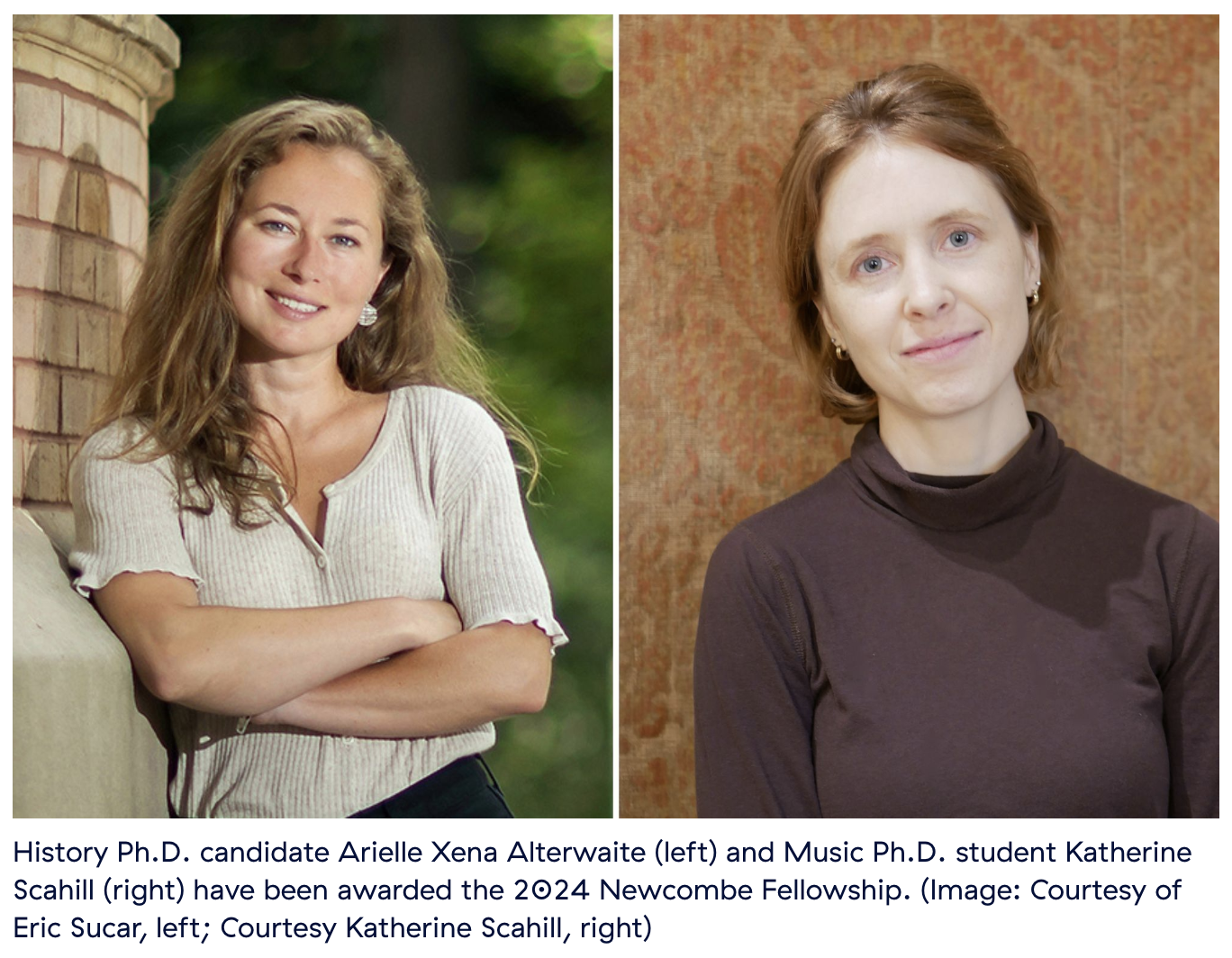Full article and images at Penn Today
Writer: Kristen de Groot
Photographer: Eric Sucar
Two University of Pennsylvania Ph.D. candidates in the School of Arts & Sciences have been named to the 2024 class of the Charlotte W. Newcombe Doctoral Dissertation Fellowship, administered by the Institute for Citizens & Scholars.
The Newcombe Fellowship, funded by the Charlotte W. Newcombe Foundation, is the largest and most prestigious award for Ph.D. candidates in the humanities and social sciences addressing questions of ethical and religious values in interesting, original, or significant ways. Fellows receive a 12-month award of $31,000 to support the final year of dissertation writing.
Arielle Xena Alterwaite, a Ph.D. candidate in the Department of History, and Katherine Scahill, a Ph.D. candidate in the Department of Music, were named as 2024 Fellows.

Alterwaite’s research explores Haiti’s sovereign debt in the aftermath of the Haitian Revolution in her dissertation, “Empire of Debt: Haiti and France in the Nineteenth-Century Atlantic World.”
“With support from the Newcombe Foundation and its interdisciplinary focus, I look forward to deepening the ways in which I can bring my work to broad audiences,” Alterwaite says. “My hope is that this archivally grounded historical account of Haitian debt in a global context can speak to international activists, legislators, and policymakers who take the ethical ramifications of finance seriously.”
History department chair Sophia Rosenfeld says it’s no surprise that Alterwaite continues to win an extraordinary number of major external fellowships, including, now, the Newcombe.
“For her dissertation, she has taken on a crucial topic in 19th century Atlantic history—the massive debt that a newly independent Haiti owed to the French state—and she has managed both to find brand-new sources for understanding it and to generate new explanations that have real implications for thinking about sovereign debt and reparations for slavery today,” Rosenfeld says.
Scahill’s dissertation, “The gendered politics of religious authority in Thai Buddhism: Voice, embodiment, and sonic efficacy in the movement for female monastic ordination,” is based upon ethnographic fieldwork with three communities of female Buddhist monks (bhikkhunīs) in Thailand. Drawing on the fields of religious studies and music studies, her dissertation investigates the sonic practices bhikkhunīs employ to establish alternate channels of recognition, given that women’s ordination is not accepted at a national level.
“I am honored to have been selected as a 2024 Newcombe Foundation Doctoral Dissertation Fellow. The Fellowship will provide me with the resources and time I need to adequately engage with the stories and practices shared at bhikkhunī monasteries,” Scahill says. “I am truly grateful for this opportunity.”
Timothy Rommen, chair of the music department, says he’s unsurprised that Scahill’s “excellent” work continues to be recognized.
“Katherine’s dissertation intervenes at the intersections of ethnomusicology, religious studies, and gender studies to explore what she calls efficacious chant. What makes her project so interesting and innovative is her recognition of a set of lacunae within the study of Buddhist chant,” he says. “While text, context, and religious labor have all been explored, very little has been written about the female monastics on which this dissertation is focused or on the role of ‘voice’ within their practice. Katherine zooms in on the ways that chant helps train monks to stabilize their own bodies while also making them aware of the body’s instability. We are all convinced that Katherine’s dissertation will make a signal contribution to several disciplines.”
Funding at the dissertation stage remains a vital way to support up-and-coming scholars. Since its creation in 1981, the Fellowship has supported more than 1,300 doctoral candidates with essential time and resources to complete their writing. Newcombe Fellows have gone on to be noted faculty at domestic and foreign institutions, leaders in their fields of study, Pulitzer Prize winners, MacArthur Fellows, and more.
Full article and images at Penn Today
